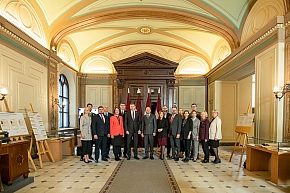 VideosGallery
VideosGallery
“The path of parliamentarism is not easy or simple—it requires the ability to acknowledge and reconcile different ideas and opinions, to listen to different representatives from different regions and interest groups. In parliamentary democracy, an effective democratic instrument is needed to enable smooth and constructive legislative process. There is a need for legislative traffic rules, known and respected by all. It ensures that the legislative process is clear, understandable to the public, and sufficiently smooth. The Saeima Rules of Procedure have turned out to be such an instrument,” said Edvards Smiltēns, Speaker of the Saeima, on Thursday, 16 March, at the opening of the exhibition “100 Years of the Rules of Procedure of the Saeima” at the Parliament.
“Just like our society, the legislative process has changed. Without doubt, the Rules of Procedure of the Saeima have changed with it. We may expect more changes in the future, but it is clear that the Rules of Procedure will always accomplish their main function: to ensure the order and clarity of the legislative process, allowing to fulfil the most important thing—the will of the citizens and voters of the Republic of Latvia—in an understandable, transparent, and democratic way,” stressed the Speaker of the Saeima.
In his address, Edvīns Danovskis, Senior Legal Advisor of the Legal Bureau of the Saeima, noted that the Constitution of Latvia lays down requirements for the content of laws and the values to be defended by laws, but the Rules of Procedure of the Saeima is the only law that specifies the legislative procedure at the Parliament. In addition, Danovskis highlighted that our legal system does not have many laws whose texts could be traced so far back, with origins in such a distant past.
The exhibition “100 Years of the Rules of Procedure of the Saeima” presents not only the 1923, 1929, 1994, and the contemporary version of the Saeima Rules of Procedure, but also the texts of the laws that Members of Parliament used as the basis for the law governing the work of the Saeima—the rules of procedure of the People’s Council and the Constitutional Assembly. The exhibition also displays historical photographs, an improvised desk of a 1920s Member of the Saeima, as well as the original minutes of the Saeima Organisational Committee, responsible for drafting the Rules of Procedure.
The exhibition was created by the Saeima in cooperation with the Latvian National Archives and the National History Museum of Latvia. Materials of the Saeima Library, the Latvian War Museum, the National Library of Latvia, the Latvian State Archive of Audiovisual Documents, and the Latvian State Historical Archives were used in the exhibition.
Photos: https://www.flickr.com/photos/saeima/albums/72177720306771008
Disclaimer and copyright: https://www.saeima.lv/en/copyright
Saeima Press Service







